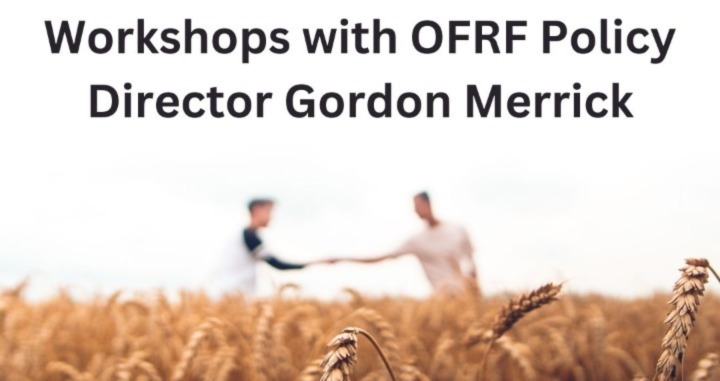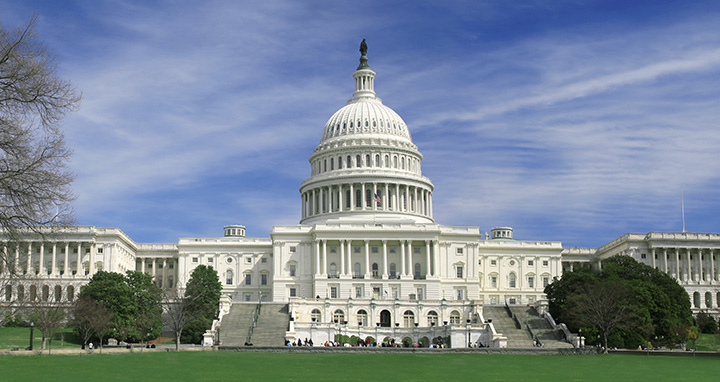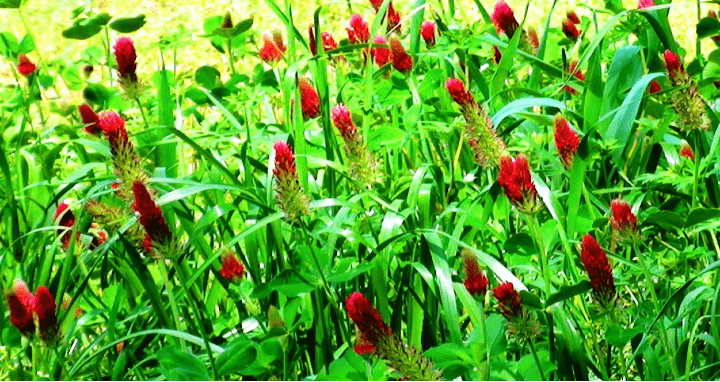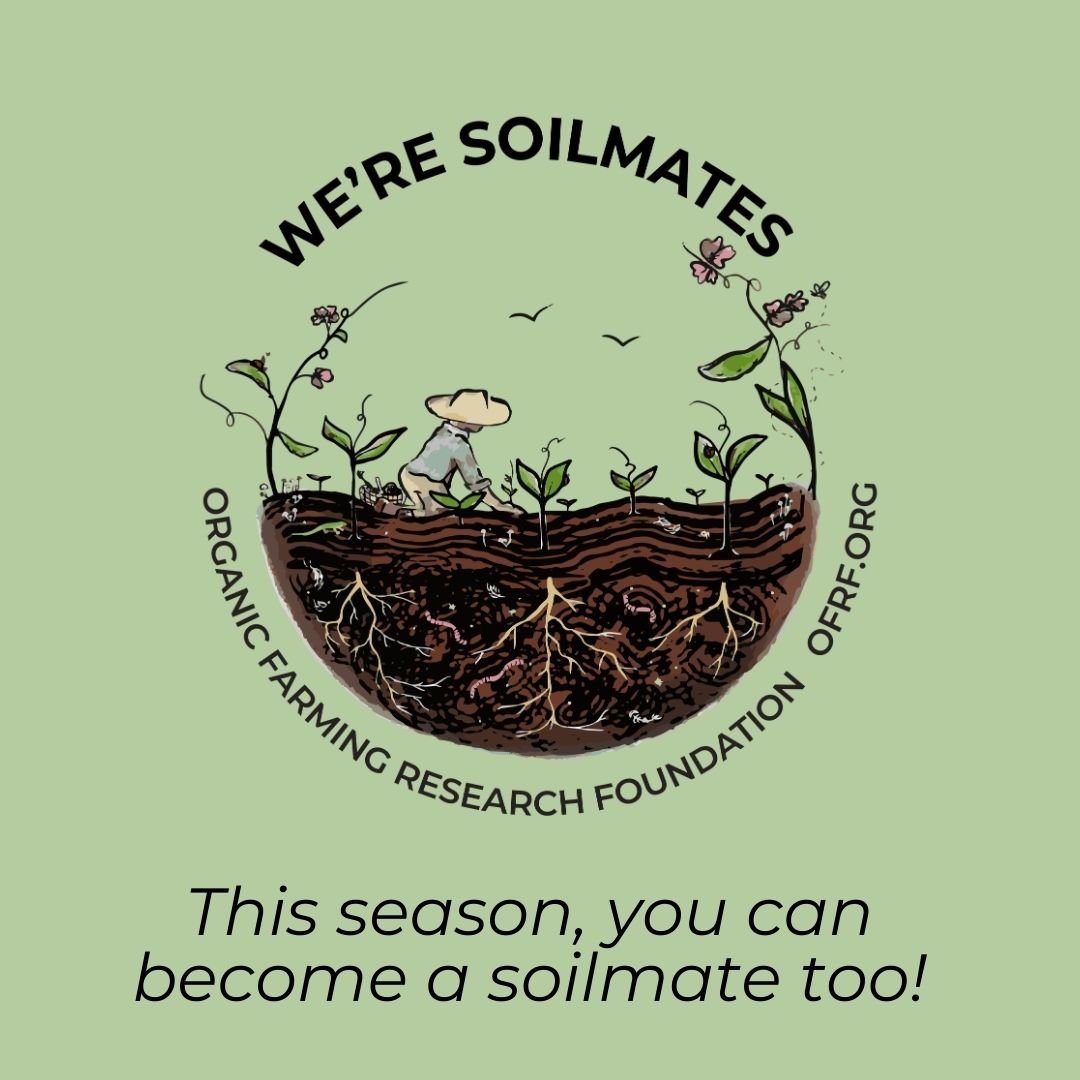ADVOCACY
OFRF’S STANCES
Policy Priorities
As an organization committed to the improvement and widespread adoption of organic farming systems, OFRF is deeply involved in both the farm bill and the appropriations processes. We are working hard to advocate for organics at every turn.
At the core, OFRF is concerned with:
- Building resiliency to both climate and supply chain disruption through organic management and more localized food systems.
- Investing in research in organic agriculture. Research has significant benefits to public good and return on investment, with each dollar of investment into public research providing over $20 in economic benefit.
- Supporting the expansion of organic production to meet increasing market demand for organic products through additional investments in research relevant to organic producers.
- Making sure organic producers, and those interested in transitioning to organic production, have the research tools and opportunities needed to thrive.
OFRF’S ACTIONS
Sign-on letters
- Organic Research in the Next Farm Bill Sign-on Letter (June 2024)
- Safeguarding Agricultural Research Funding Sign-on Letter (July 2023)
- Organic Science and Research Investment Act (OSRI Act) Sign-on Letter (July 2023)
- Strengthening Organic Agriculture Research (SOAR) Act Sign-on Letter (May 2023)
- Building Resilience Through Agricultural Research in the Upcoming Farm Bill (November 2022)
- Group Support of Climate Solutions in the Inflation Reduction Act of 2022 (August 2022)
- Group Support of Extending OTECP Deadline Application (December 2021)
- OFRF Letter to Leadership to Support Ag Research (October 2021)
- Group Support of $28 Billion Investment of USDA Agriculture Conservation Programs (October 2021)
- Farm to Fork – Statement on Reconciliation Bill (September 2021)
- Letter to Thomas J. Vilsack, Secretary, USDA (March 2021)
- Letter to USDA: Organic Organizations and Farms ask USDA to Swiftly Finalize Rule to Save Family Organic Dairy Farms(January 2021)
Agency/Administrative Comments
- OFRF Comments on AMS’s Specialty Crop Competitiveness Initiative (SCCI) (March 2024)
- OFRF Comments on NRCS Conservation Practice Standards (CPS) (March 2024)
- Written Comments for NOSB Meetings (April 2022)
- Letter to USDA National Organic Program to Protect Native Ecosystems (March 2022)
- OFRF Comment on Climate-Friendly Agriculture and Forestry Partnership Program (November 2021)
- OFRF Comment on Equity at USDA (August 2021)
- OFRF Comment on NIFA 2023 Priorities (June 2021)
- OFRF Comment on Climate Action (May 2021)
- Comments on Proposed Revisions to NRCS Conservation Practice Standards (April 2021)
- Letter to Thomas J. Vilsack, Secretary, USDA (April 2021)
- OFRF USDA Agency Recommendations 2021 (April 2021)
- OFRF Letter to the Agriculture Research Service (December 2020)
- OFRF Letter to Biden Administration/Transition Team (November 2020)
Congressional Comments and Testimony
- Testimony Submitted by Gordon N. Merrick, FY 2025 Appropriations for United States Department of Agriculture (May 2024)
- Testimony Submitted by Gordon N. Merrick, FY 2025 Appropriations for United States Department of Agriculture (April 2024)
- Testimony Submitted by Gordon N. Merrick, FY 2024 Appropriations for United States Department of Agriculture (April 2023)
- Testimony Submitted by Gordon N. Merrick, FY 2024 Appropriations for United States Department of Agriculture (March 2023)
- Submitted Statement of Thelma Velez to the House Committee on Agriculture in Climate Research Hearing (June 2022)
- Comments to the Senate Democrats’ Special Committee on the Climate Crisis (June 2020)
- Appropriations Request Fiscal Year 2021 (February 2020)
- Policy Recommendations on Organic Agriculture, Climate Mitigation and Resiliency (November 2019)
- Testimony to the U.S. House of Representatives, Agriculture Committee, Subcommittee on Biotechnology, Horticulture, and Research (June 2019)
- 2018 Research, Education, and Economics Farm Bill Implementation Listening Session (March 2019)
- Testimony for Fiscal Year 2018 to House Appropriations Committee Subcommittee on Agriculture, Rural Development, Food and Drug Administration, and Related Agencies (April 2017)
- Testimony to the House Appropriations Committee, Subcommittee on Agriculture Rural Development, Food and Drug Administration and Related Agencies (March 2016)
ADVOCATE FOR ORGANIC
Submit Your Researcher Story
Why We Want You to Share Your Story
We need your help to deepen the impact of our advocacy work! Facts, figures, and statistical breakdowns of the effects of increased public investment in agricultural research are important, but the lived experiences and stories of researchers and farmers communicate more than a report ever can. This is why we are beginning to implement a new strategy in our policy advocacy: story banking. We are collecting and amplifying stories of researchers around the U.S. who have effectively shared their research with decision-makers.
Learn About Communicating with Legislators
In this jam-packed workshop, OFRF’s Senior Policy and Programs Manager Gordon Merrick explains how and why farmers and researchers might communicate with their legislators. Learn how the legislative process works, in a nutshell, as Gordon packs semesters of legislative law courses into a few minutes of plain-spoken presentation for the rest of us. You’ll also see examples of effective farmer and researcher engagement with policy makers, and hear why directly engaging with representatives can have a huge impact on advancing organic farming and food systems. If you are a farmer or researcher who wants know more about getting involved with advocacy, this presentation is for you.
Farm Bill Toolkits
Thank you for your interest in the work that the Organic Farming Research Foundation (OFRF) is doing advocating for continued public investment in organic agriculture research programs by encouraging cosponsorship of the SOAR Act in the House and the OSRI Act in the Senate. We are so excited to get you involved in making sure this Farm Bill supports farm-centered, action-oriented research programs like the Organic Research and Extension Initiative (OREI). These toolkits provides background information about the bills and templates you can use to mobilize your organization’s members or yourself to contact legislators. These are meant to be starting points. For more significant impact, tailoring the materials using personal stories is an important next step in this work!
Find Your Representative
Our goal is to provide you with the best information to sustain powerful organic advocacy in your community.
Please feel free to use the following Organic Advocacy Tools. You may always contact us if you need additonal items, we’ll do our best to support you in raising the voice of organic farmers.
Find out who represents you in Congress by searching a database by your zipcode or state.
GORDON’S POLICY CORNER
Communicating with Legislators workshop series
The Organic Farming Research Foundation is hosting a series of workshops this spring on Communicating with Legislators. The free session will be free and held remotely. The first two sessions will be Tuesday, February 28th and Wednesday, March 15th, with more to come later in the spring!
Catching up on the Farm Bill in Gordon’s Policy Corner
OFRF and our partners are getting a clearer picture of the Farm Bill landscape. One thing remains abundantly clear, that agricultural research continues to be a bright spot for bipartisan legislation, and we are excited to leverage that fact this Farm Bill cycle.
Farmers on the Frontlines: Climate Change and the Farm Bill
Farmers and ranchers, the people who produce our food, are often on the frontlines of challenges facing our society. Among the most pressing of those issues is the changing climate and an industrial food system that prioritizes profits over the health and wellbeing of people and the planet. Because of their place on the front lines of these challenges, farmers and ranchers represent a vibrant space of innovation and creativity to meet them. The 2023 Farm Bill cycle is a ripe opportunity to make solid advances towards a just transition to a new type of production that both mitigates and adapts to our changing climate.







